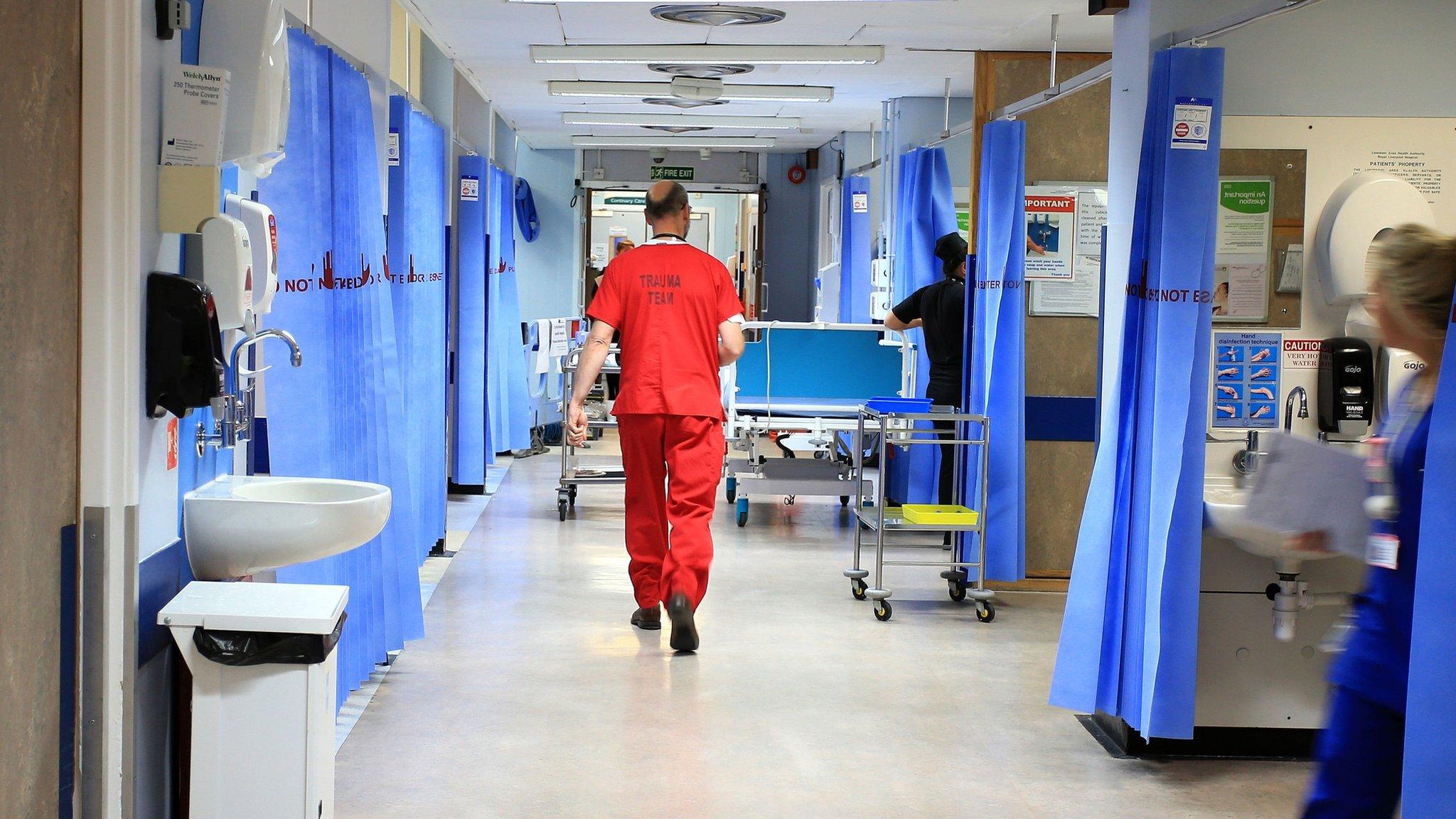NHS Wales: £700m 'black hole' fear as pressures rise
- Published

The NHS in Wales could face a £700m black hole in its finances in just three years time according to new research by leading experts.
The health service here is "currently facing the most financially challenging period in its history", according to the Health Foundation think-tank.
The shortfall would be equivalent to more than 10% of what NHS Wales currently spends in an entire year.
It also warns the costs of social care might nearly double by 2030-31.
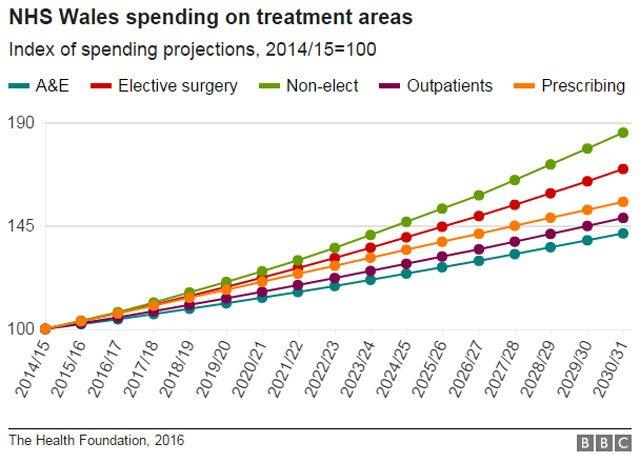
PRESSURES AS WALES GROWS - AND GROWS OLDER
The foundation's analysis suggests NHS Wales could end up spending more than it gets because of increasing pressure caused by a growing and ageing population.
This results in significant increases in the number of patients living with long-term serious health conditions.
The analysis assumes spending on the NHS in Wales will rise over the next four years in line with projected health spending in England - an annual increase of 0.7%.
Between 2011-12 and 2015-16 health spending in Wales only rose by an average of 0.1% a year.
But the research suggests the financial gap could be closed if pay rises among NHS Wales staff continue to be limited to just 1% a year - and if the service could also deliver annual efficiency savings of 1.5%.
However, that is higher than what is currently being achieved by the NHS across the UK - and savings on that scale are described as "extremely challenging" although "not unprecedented".
The Welsh Government said: "We're working to ensure our NHS is financially sustainable for the future and welcome the optimism in today's report".
'Harder to find NHS savings' and more reaction
RECRUITMENT ISSUES AND THE COST OF AGENCY STAFF
The report warns keeping a 1% pay cap over the longer term could seriously affect staff morale and cause big problems in trying to attract and keep staff in the Welsh NHS.
That would mean the Welsh health service finding a higher level of savings than what is currently being achieved across the UK, although according to the authors it is not "unprecedented".
Recruitment and retention of front-line staff is a significant problem in some specialisms and in certain parts of Wales.
The report warns that holding pay for this extended period could have "negative impacts in terms of morale, recruitment and retention - this is partly evident from the recent a substantial increases in spending on agency staff".
The authors also note that spending on agency staff in the Welsh NHS rose by 60% in just one year between 2014-15 and 2015-16.
They add that if the use of agency staff continues to increase, the additional cost "would reduce the potential savings from the pay policy".
As a result the report calls for a "strong focus" on workforce planning to make sure "the right people have the right skills" to deliver NHS services in the future.
Currently there are 630 vacancies at NHS Wales - nearly 300 of them nurses.
The NHS Confederation - which represents health boards in Wales - said as well as issues of workload, we are now seeing the impact of cuts in training places at the start of the decade.
SOCIAL CARE COSTS SET TO SOAR TOO
Adam Roberts, head of economics at the Health Foundation, says without action by 2019/20 other public services in Wales could be hit.
It also warns that significant additional investment will also be needed in social care services.
The authors estimate the pressures on social care will rise at a faster rate (4.1% a year) than the pressures on NHS - and to match that demand the social care budget in Wales would need to almost double to £2.3bn a year in 15 years time.
Unless that happens the report warns - there is a" real risk" that the level of unmet need for care services in Wales could rise.
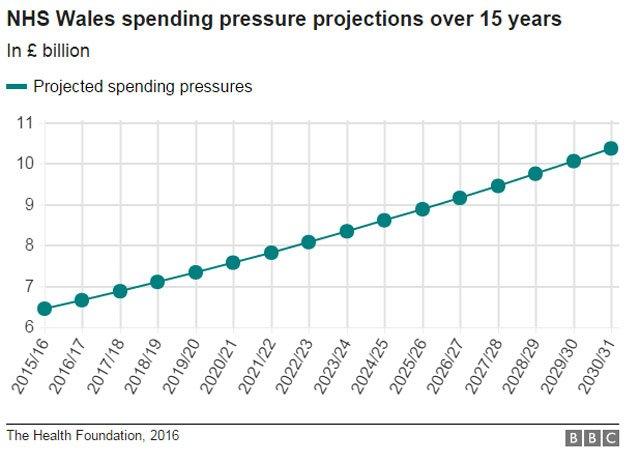
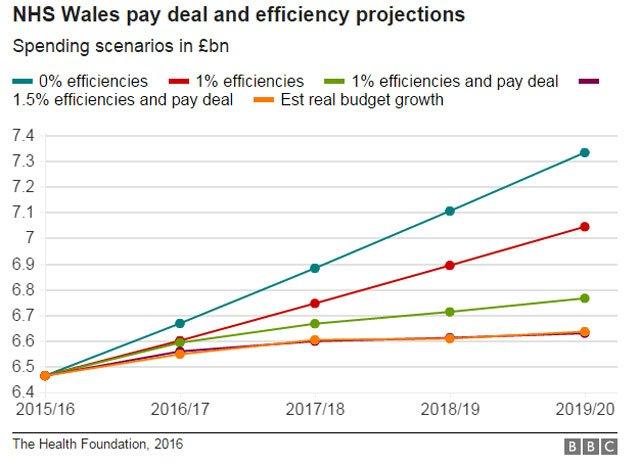
LONGER TERM CONCERNS
As well as problems in the short term, the report warns:
Without any action, additional pressures could mean the NHS budget might have to increase from £6.5bn now to £10.4bn in 15 years time
That would require a 3.2% annual real terms increase in NHS funding
But if the NHS found 1% efficiencies it suggests the increased spending could be achieved by increasing the NHS budget by 2.2% a year - which is equivalent to the projected growth in the UK economy during this period
If Brexit leads to reduced economic growth across the UK - it could make it more difficult to put the Welsh NHS on a sustainable footing. To avoid the impact on the NHS budget it might mean higher taxation, more cuts in other public spending or extending austerity
The projections are based on maintaining the current range and quality of NHS services - but does not take into account any major technological or medical advances bringing their own demand.
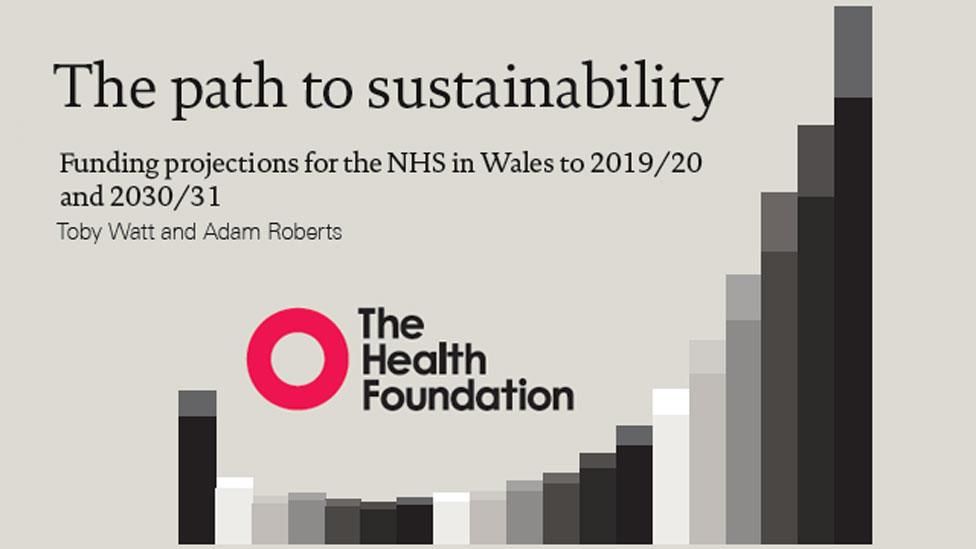
The Healthcare Foundation is an independent charity and think-tank
The Path to Sustainability report also finds:
Despite pumping millions of extra pounds into the NHS in recent Welsh budgets the analysis says "signs of pressure are beginning to show" - the NHS overspent its budget by £50m in 2015-16 - thanks to deficits at Hywel Dda and Betsi Cadwaladr health boards
The need for further efficiencies is likely to be "extremely challenging".
The population of Wales is expected to grow by 5.6% between now and 2030 but the proportion of elderly people (aged over 65) is predicted to grow by 28.5% in same period
Chronic conditions rise with age but the current trend is "over and above" simply an ageing population, with factors like rising obesity rates
Combining projections for all services - total spending pressures on the NHS will grow an average of 3.2% a year from now on - resulting in £3.9bn extra needed by 2030-31
In next week's Welsh Government budget, if the NHS Wales budget is protected, the analysis suggests that 7.4% cuts in other devolved services by 2019-20 - similarly 2% increases in NHS spending - could lead to average reductions of 18% for other devolved services over next four years. But these cuts in other areas could have consequences back on the NHS in terms of pressures
Principles of prudent health care - aiming to see fewer patients in hospital - although they could be of longer term benefit are "unlikely to play a major role in closing the NHS funding gap"
Given that funding growth in NHS Wales in recent years has been low - rising 0.1% a year between 2011 and 2015 - finding efficiency savings is likely to be harder to achieve year on year
THE CONCLUSION?
Overall the authors say that making the Welsh NHS financially sustainable is "realistic" although the next few years will be "tough" with "immediate and sustained action needed to protect patient care".
WHAT IS THE HEALTH FOUNDATION?
This is the first report by the Health Foundation into the Welsh health service.
It took its economists a year to complete and was not commissioned by any public body or government.
The London-based research organisation was set up as an independent charitable trust with a £500m endowment in 1998. This allows it to set its out agenda in investigating health issues.
- Published13 October 2016

- Published3 February 2016

- Published22 April 2016

- Published8 July 2016

- Published7 July 2016

- Published6 June 2016

- Published25 August 2016

- Published11 July 2016
